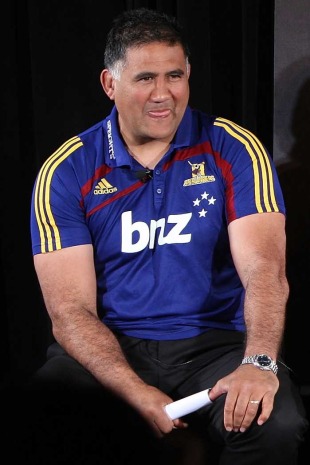|
Comment
Highlanders show signs of life
Huw Turner
February 21, 2011

Former All Black Jamie Joseph steered the Highlanders to an upset win against the Hurricanes in the opening round of the new Super Rugby season
© Getty Images
Enlarge
The first weekend of the extended and re-vamped Super Rugby season delivered a mixed bag of rugby in New Zealand. The Blues and Crusaders inevitably attracted all of the attention at Eden Park, the Blues storming home in a contest of Test match quality containing many high class individual performances. This was in stark contrast to Friday evening's season opener in Wellington between the Hurricanes and the Highlanders, a generally drab, error-strewn and underwhelming contest. However, it is the Highlanders' surprise win over the perennial underachievers from the capital that is of most potential significance to the longer term development and survival of professional rugby throughout New Zealand. That, and the debut and emergence of new coach Jamie Joseph, a potential All Black coach of the not too distant future. Otago, in the deep south of New Zealand, is one of the traditional provincial powerhouses of New Zealand rugby. You don't have to go back too far in history to come up with the names of some very illustrious All Blacks who first made their mark at Carisbrook: Jeff Wilson, Taine Randell, Josh Kronfeld, Byron Kelleher, Anton Oliver, Kees Meeuws. In the amateur era, foreign tourists were guaranteed a torrid time at Carisbrook, the famously ferocious rucking of the home forwards more than a match for all but the very best. Always a force within the National Provincial Championship, winners in 1991 and 1998, the Otago style was an attractive blend of forward power and innovative back play. With the advent of professional rugby and the inauguration of Super Rugby the Otago Highlanders prospered initially. They hosted the 1999 final, only to lose out to a Canterbury Crusaders side in the early stages of establishing a formidable record and reputation. The retirement and departure to other pastures of the above-named All Black greats set in place a steady decline in Otago's rugby fortunes, a decline symbolised in the decay of Carisbrook, one of the more iconic rugby venues in New Zealand rugby. A new stadium, complete with retractable roof, welcome insurance against the icy blasts that come sweeping in off Antarctica in winter, is being constructed, it is hoped in time for the start of the World Cup. The reconstruction of the competitive viability of both the Otago and Highlanders brands is of similar urgency. In recent times there has been talk of the NZRU shifting the Dunedin-based operation to another centre, possibly giving the city and region of Auckland a second franchise to reflect the size of its population. In many ways this would be a disaster and leave Christchurch as the only South Island rugby centre. The revival of rugby in Otago is imperative for the wider health and strength of New Zealand and All Black rugby. This is why the appointment of Jamie Joseph as coach for the 2011 Super 15 rugby campaign was so important. Turning around the fortunes of an under-performing and ailing franchise is a formidable challenge, but the rewards for the former Otago and All Black blindside flanker are potentially just as formidable.
Joseph comes out of the rugby mould labelled 'Hard Man.' Between 1992 and 1995, the years before the World Cup in South Africa and then the introduction of professional rugby, Joseph won 20 caps for the All Blacks, in the amateur days a considerable career. He then became part of the rugby migration to Japan and in one of those pieces of nonsense which has afflicted international rugby since 1995, he played for Japan at the 1999 World Cup. One of my enduring memories of Joseph the player was a Test against England at Twickenham in 1993. He put Kyran Bracken, the England scrum-half out of the game when he trod on his ankle - or stamped on him, depending on your linguistic sensibilites. Joseph was an uncompromising physical presence and it is this quality, so long associated with Otago forward play that he will want to restore to Highlanders rugby. In recent times Otago has been short of on-field star quality and a succession of coaches have been exposed as insubstantial. Worryingly, the franchise has had to go outside its geographical borders and recruit from other parts of New Zealand, no great testimony to the player depth within Otago. I haven't heard anyone suggesting that the Highlanders are likely title contenders in 2011, but a return to serious competitiveness would represent a triumph for Joseph. An All Black victory at this year's World Cup would no doubt see Graham Henry's triumphant retirement and Wayne Smith and Steve Hansen possibly seeking new challenges. Defeat would see them being shown the door. In any event, there are likely to be vacancies at the top. It might be too soon for Jamie Joseph, but a compelling Super Rugby campaign from the Highlanders would put him in the frame. The win over the Hurricanes was ugly. But it was a win. That is a start. © ESPN Sports Media Ltd.
| |||||||||||||||
Live Sports
Communication error please reload the page.
-
Football
-
Cricket
-
Rugby
-
- Days
- Hrs
- Mins
- Secs
F1 - Abu Dhabi GP
Abu Dhabi Grand Prix December 11-131. Max Verstappen ()
2. Valtteri Bottas (Mercedes)
3. Lewis Hamilton (Mercedes)
4. Alexander Albon ()
5. Lando Norris ()
6. Carlos Sainz Jr ()
-
ESPNOtherLive >>
Snooker - China Open
Tennis - Miami Open

